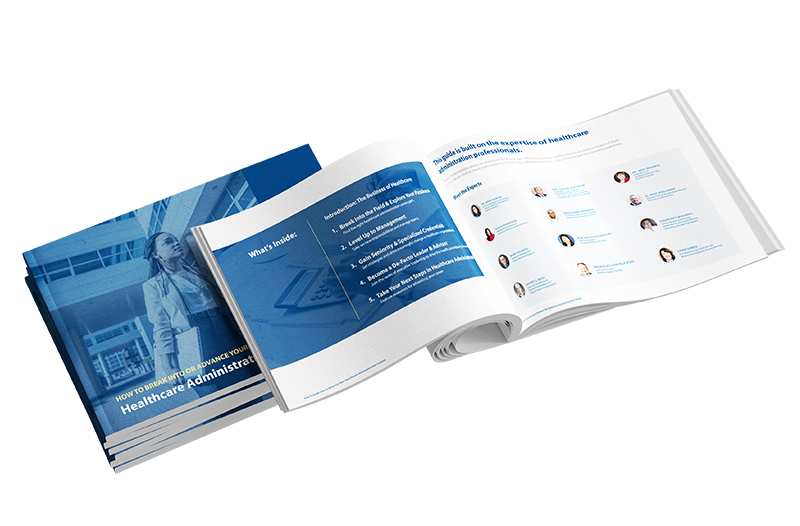Request Information
We're Sorry
There was an unexpected error with the form (your web browser was unable to retrieve some required data from our servers). This kind of error may occur if you have temporarily lost your internet connection. If you're able to verify that your internet connection is stable and the error persists, the Franklin University Help Desk is available to assist you at helpdesk@franklin.edu, 614.947.6682 (local), or 1.866.435.7006 (toll free).
Just a moment while we process your submission.

Ways to Gain Business Leadership Skills in Healthcare
If there’s one topic that’s been written about, studied, examined and researched to the nth degree, it’s leadership.
The need for highly effective, skilled leaders is enormous – especially in healthcare where innovation, success strategies and problem solving are desperately needed on a daily, even hourly, basis.
A 2014 survey by the non-profit National Center for Healthcare Leadership says that the unprecedented pace of change within healthcare organizations requires new leadership competencies, including less focus on individual leaders and more focus on the capabilities of leadership teams. It also identified leadership as an important role for improving health outcomes.
Unfortunately, what makes for a great leadership team within the healthcare setting can be difficult to define. Leadership characteristics can be vague, nebulous and even downright elusive.
So, taking a cue from the business world, we narrowed down exactly which business skills are necessary to become an effective leader within the realm of healthcare. More importantly, we’ve sought out the best advice for how you can gain these skills so you can take your leadership savvy to the highest level.
Because there are literally hundreds of thousands of articles and books on top leadership traits, instead of culling through a virtual library of sources, we went to an expert on healthcare leadership, Leslie King, Ph.D., dean of Franklin University’s College of Health & Public Administration.
In addition to being the dean of the college, he’s also the program chair for the Doctor of Healthcare Administration (DHA), and serves on the Higher Education Network Committee for the American College of Healthcare Executives (ACHE).
Here’s our Q&A with Dr. King on why – and how – to gain business leadership skills in healthcare.
Why is there such a need for business-style leadership in healthcare right now?
There’s been a slow shift in healthcare in this country over the last five or so years with the Affordable Care Act (also known as “Obamacare.”) There’s no question that America has some of the most advanced medicine, technologies and healthcare educational institutions, and yet we have one of the least effective healthcare systems in the world. It’s kind of an embarrassment how low we are on a global scale. Just a few years ago, The World Health Report ranked our healthcare system 37th in the world. Clearly we’re not missing technology, education or elaborate systems, but we are missing something. And that something is – people who can lead healthcare organizations way beyond individual components to serve the betterment of communities.
What’s wrong with our healthcare system and how can business-inspired leadership make a positive impact?
Healthcare is a complex system and it seems as if we haven’t figured out as a country how to get all of the good stuff we have to serve human populations. Instead we have lots of people coming into a system that’s not doing very well. It’s expensive to treat the onset of disease. We need to understand population health, which means that instead of waiting for people to get sick and come to us, we need to go to populations with our services – especially education and preventive ones. One of the greatest failures we’ve seen in this country is how to make all of our healthcare components work together to improve outcomes, decrease costs, reduce prevalence and prevent the onset of disease. We need leaders who don’t just treat disease but ensure human health across communities instead.
Advance your career in Healthcare Administration while you advance patient care. Download your free career guide.
What makes a great leader?
There are several crucial qualities and business leadership skills for this age of unprecedented healthcare reform. In my experience, here are 11 qualities that make for a great leader. A great healthcare leader:
- Has vision and executes it
- Inspires others to engagement and action
- Makes well-informed, confident decisions
- Treats people fairly
- Is a good communicator
- Takes smart and calculated risks
- Is a lifelong learner
- Understands that healthcare is as much about preventing disease as treating it
- Empowers and mobilizes people inside and outside of the healthcare system
- Looks for ways to understand and advance human health
- Takes a holistic approach to decision-making and problem solving
How can a next-generation leader acquire these important business skills?
One of the best ways to enhance your own research and leadership training is through a doctoral program, either a Ph.D. or an applied doctorate in healthcare administration. A terminal degree will help leaders research and understand the broad implications of politics, economics and operations. Advanced degrees such as the applied doctorate, can produce the kinds of leaders who can solve pressing health problems, such as prevalence of obesity within a population or a medical procedure with a high mortality rate. We know that delivery of care and healing isn’t just about checkboxes with inputs and outputs. Today’s and tomorrow’s healthcare leaders have a unique opportunity to leverage business leadership skills so that what they do will have a positive and meaningful impact on the healthcare system.
How can a doctoral degree make me a better leader?
An applied professional practice degree such as a doctorate in healthcare administration will prepare you to become an expert who has a real understanding of the value of all the players in the continuum of care – not just within the hospital but also within the local and national community. Doctorally trained leaders understand that their role is not just to lead others in preventing disease, but also to empower and mobilize people for health’s sake. Great leaders never clock out; they’re always looking to pursue and advance their understanding of the complexities of the changing culture of human health, as well as manage the driving forces for maximum positive impact. Great leaders also know how to engage and be inclusive. Anyone can balance a budget or deal with inputs and outputs. It takes a special kind of leader, though, to look at every person inside and outside of the healthcare system and treat him or her holistically. It becomes something more spiritual, more emotional and more societal when we have healthcare leaders who look at each patient and worker as though it’s someone in their own family.
Learn more about how Franklin's DHA can make you a better leader.





